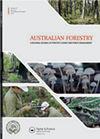以树种组成为导向的造林对木材价值和碳的影响——以中国亚热带林分为例
IF 0.9
4区 农林科学
Q3 FORESTRY
引用次数: 0
摘要
植树造林中的物种选择和组成会影响森林特征,而森林特征又会影响森林为社会提供的生态系统服务的质量和数量。各种森林产品和服务之间的权衡和协同作用是多用途森林管理的关键问题。在本研究中,我们提出了一个林分水平的综合分析框架,应用动态森林模拟器PICUS v1.5和技术经济分析来评估一系列以物种组成为导向的造林选择对中国亚热带木材价值和碳固存的影响。其目的是向利益相关者通报看台级别方案的成本和收益。以马尾松和红锥分别代表我国亚热带主要乡土针叶树和阔叶树,研究了五种典型的造林选择:马尾松常密度和高密度单作(树干ha−1);C.hystrix纯林分;以及两种物质的均匀老化和不均匀老化的混合物。结果表明,与其他四种选择相比,不均匀老化的混合物在固碳方面表现更好。均匀老化的混合物显示出更好的木材生产和碳固存的综合效益,以及在50年内平衡长期和短期效益的额外优势。此外,均匀老化的混合物对市场波动的适应性最强。在未来木材价格上涨的情况下,在五种选择中,不均匀老化的混合物在经济上表现最好。研究结果将告知利益相关者林分水平造林方案在收入和社会环境效益方面的表现。本文章由计算机程序翻译,如有差异,请以英文原文为准。
The effects of species-composition-oriented silviculture on timber value and carbon – a stand-level case study in subtropical China
ABSTRACT Species selection and composition in afforestation affect forest characteristics, which, in turn, affect the quality and quantity of ecosystem services a forest provides to society. Trade-offs and synergies among the various forest goods and services are key issues in multipurpose forest management. In this study, we propose a stand-level integrated analysis framework applying the dynamic forest simulator PICUS v1.5 and techno-economic analysis to assess the effects of a range of species-composition-oriented silvicultural options on timber value and carbon sequestration in subtropical China. The aim is to inform stakeholders on the costs and benefits of the stand-level options. Taking Pinus massoniana and Castanopsis hystrix to represent dominant native conifers and broadleaves, respectively, in subtropical China, five typical silvicultural options were studied: P. massoniana monoculture with normal and high density (stems ha−1); C. hystrix pure stands; and even-aged and uneven-aged mixtures of both species. Results indicate that the uneven-aged mixture performed better in carbon sequestration than the other four options. The even-aged mixture showed better combined benefits of timber production and carbon sequestration and additional advantages in balancing long- and short-term benefits over 50 years. Furthermore, the even-aged mixture had the strongest adaptability to market fluctuations. The uneven-aged mixture performed best economically among the five options in scenarios of future higher timber prices. The results will inform stakeholders about the performance of stand-level silvicultural options with respect to revenues and environmental benefits to society.
求助全文
通过发布文献求助,成功后即可免费获取论文全文。
去求助
来源期刊

Australian Forestry
FORESTRY-
CiteScore
3.70
自引率
4.80%
发文量
15
审稿时长
>12 weeks
期刊介绍:
Australian Forestry is published by Taylor & Francis for the Institute of Foresters of Australia (IFA) for scientific, technical, and professional communication relating to forestry in the Asia Pacific.
 求助内容:
求助内容: 应助结果提醒方式:
应助结果提醒方式:


